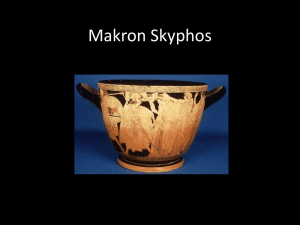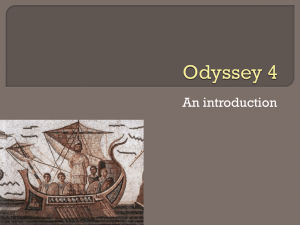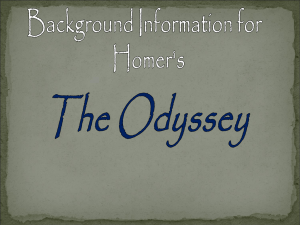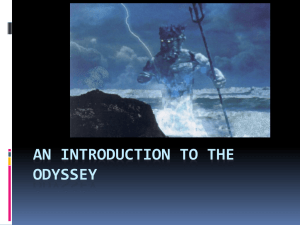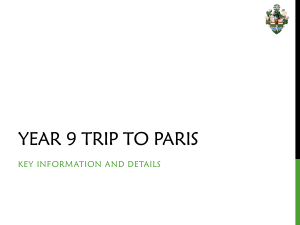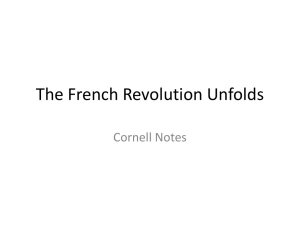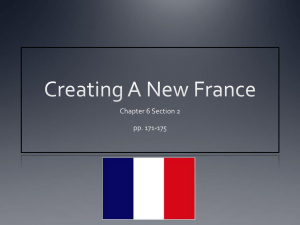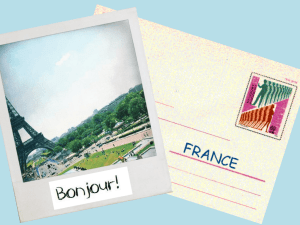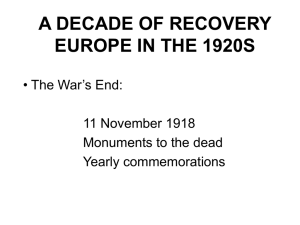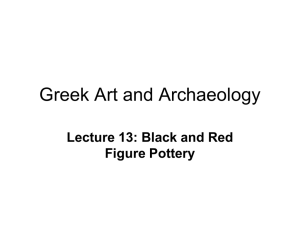Makron Skyphos
advertisement
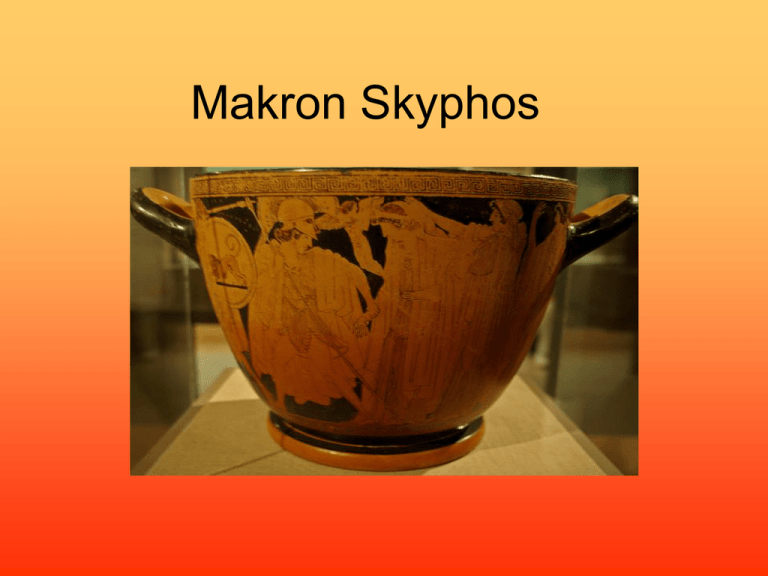
Makron Skyphos OUTLINE OF PRESENTATION • • • • • • • • • Attribution details The Shape The Scene, Side A Composition of Side A Painting Technique The Scene, Side B Composition of Side B Narrative technique The Style Attribution details: Name: Skyphos When made: 490- 480 BC Size: 21.5cm Potter: Hieron Painter: Makron How do we know: We know Hieron and Makron have both signed their names at the handles on the Skyphos vase. HIERON EPOIESEN "Hieron made (it)” MAKRON EGRAPHSEN "Makron drew (it)" Shape: 1.The vase shape is a Skyphos. 2. Use: For drinking wine. 3.The Skyphos vase is perfect for it’s shape the shape consists of a huge deep drinking cup for wine at symposiums’. - Because of the huge space of the frieze it gave Makron the opportunity to draw detailed figures and decoration. The Scene, Side A The Scene, Side A Left to Right: Aneaus, Paris, Eros, Helen, Aphrodite, Peitho (persuasion) and Helen’s son, The Scene, Side A • The myth being shown is the seduction of Helen. • Paris is leading Helen away from Sparta and the Palace of Menelaos. • Aeneaus accompanies Paris, Aphrodite, and Eros drag Helen away. Peitho (persuasion) follows behind them. • The boy underneath the handle is thought to be Helen’s son. What emphasises the seductive nature • Paris leads Helen by the arm. Rather than by abducting her, and not evoking any scared, frightened emotions, she is seduced by Paris which is quite the opposite response. • Also Aphrodite and Eros (Aphrodite's’ son) are both associated with lust and love. Composition of Side A The reason as to why the figure of the boy • helps to continue the story around the frieze. The thing that contemplates him • King Priam. Although sitting down he too, is the same height as the boy, underneath the same handle as well. Composition, Side A The central figures Helen, Paris and Aphrodite What unites the two figures • Paris’ touch on Helen's hand • the spear that links both, which goes across, in the front of Paris’ body down towards Helens’ legs, • Eros, and how he is flying above their heads, linking the two. Composition, Side A Simple ways Makron has managed to show depth • most of the frieze is compacted by layers and masses of billowing drapery, which portrays • Overlapping of drapery. Secondly • is the position of Aeneas shield • Paris’ spear and how both armory overlap each other. This indicates that the painter wants to show the depth in the scene. Composition, Side A • Extra points about the composition of Side A in the scene is the painting or story continuing. The little boy underneath the handle portrays that the story continues on the other side of the vase. Another is the size of Eros. It is the way he is positioned and his size that gives a three dimensional effect as well as the painter wanting to show the distance between characters’. • Another is Paris’ legs. You see how they are stretched apart, this shows that he and Aeneaus are both rushing to abduct Helen and get her out of Menelaos’ palace. Another is muscles are drawn very detailed showing strained and Painting Technique • A red figure painting technique was used. • The person carrying the shield is Aeneaus, Paris’ soldier companion. • The lion has been colored in diluted glaze. • The sandals have been colored in diluted glaze. Which is showing technical details. Painting Technique • The painting technique shown between these 2 figures is how the drapery forms in thin, precise lines. This is called incised detail, where in the drapery it creates an 3 dimensional effect. Such as, if the drapery looks either light or heavy material. • Another painting technique is the zig zags in the drapery. Because of this it creates a feeling of depth and airy. The Scene, Side B • The person seated in the chair is King Priam. • So the myth is about how Paris dies, and it is the end of the Trojan war. Menelaus reclaims Helen. In the frieze the scene depicts of Helen trying to escape from Menelaus as he knows she has been unfaithful. But something stops Menelaus from killing her, Menelaus has seen the beauty of Helen and straight away drops his sword and forgives her. The Scene, Side B • This scene relates to Side A because obviously it is a continuation of the myth. In Side A it was the beginning of the Trojan War and Helen’s unfaithfulness. As the Trojan War ends this is portrayed in Side B, as the scene is about Menelaus almost killing her for being unfaithful, however forgives her instead. In Side B Aphrodite and Peitho, Helen’s maidservants accompany her as she is returned to Menelaus. Composition of Side B • The Central focus is Menelaus and Helen. • What makes them the central focus is their pose. Both figures are the only ones out of all characters who have a lot of movement going on. Such as their legs are bent, arms stretched. Helen’s frontal pose shows the incised detail of the drapery, and she is the only one who is in a frontal pose. Another is Menelaus shield that has a bull on it. The only animal that is there which makes it the central focus. Composition, Side B • One point is of King Priam. His throne or chair really stands out, as it shows a lot of detail. • Second point is that all character’s are the same height, including the King Priam and he boy and are all on the same ground line. • Third is that there are no spaces. The painter is not comfortable to leave any gaps. The style The Meidias Painter vase • • • • • • Date: 410 BC Type: Hydria, Red figure Potter: Meidias Painter: “Meidias Painter” Height: 52.2 cm The Meidias Painter vase The style • Elegant poses and elegant drapery. The figures are delicate and movement convincing. • Graces are delicate and graceful. • Fine and elegant, bodies underneath. • Drapery follows form, clinging to the body. • Multiple lines around the body, fluttering away suggesting movement.
